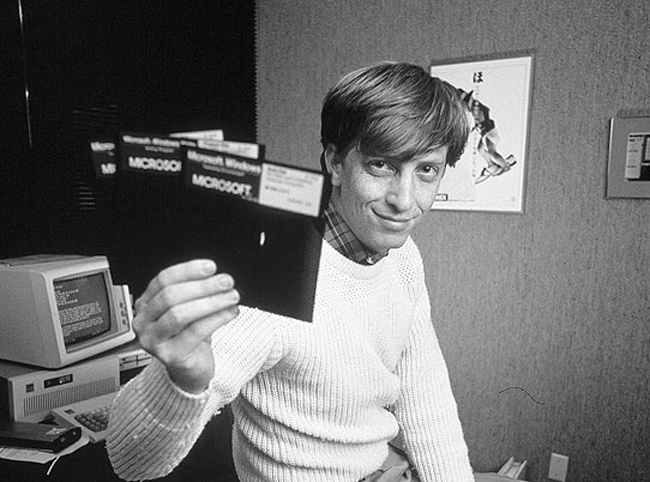Following up his authorized Steve Jobs bio, Walter Isaacson is writing a book about the icons of the Digital Era. Let’s hope he employs a large team of fact-checkers because such people tend to be fabulists. There’s an excerpt at Harvard Magazine from the forthcoming volume, about Bill Gates, who’s told a yarn or two in his day and is no stranger to the author. The opening:
“IT MAY HAVE BEEN the most momentous purchase of a magazine in the history of the Out of Town Newsstand in Harvard Square. Paul Allen, a college dropout from Seattle, wandered into the cluttered kiosk one snowy day in December 1974 and saw that the new issue of Popular Electronics featured a home computer for hobbyists, called the Altair, that was just coming on the market. He was both exhilarated and dismayed. Although thrilled that the era of the ‘personal’ computer seemed to have arrived, he was afraid that he was going to miss the party. Slapping down 75 cents, he grabbed the issue and trotted through the slush to the Currier House room of Bill Gates, a Harvard sophomore and fellow computer fanatic from Lakeside High School in Seattle, who had convinced Allen to drop out of college and move to Cambridge. ‘Hey, this thing is happening without us,’ Allen declared. Gates began to rock back and forth, as he often did during moments of intensity. When he finished the article, he realized that Allen was right. For the next eight weeks, the two of them embarked on a frenzy of code writing that would change the nature of the computer business.
What Gates and Allen set out to do, during the Christmas break of 1974 and the subsequent January reading period when Gates was supposed to be studying for exams, was to create the software for personal computers. ‘When Paul showed me that magazine, there was no such thing as a software industry,’ Gates recalled. ‘We had the insight that you could create one. And we did.’ Years later, reflecting on his innovations, he said, ‘That was the most important idea that I ever had.’
In high school, Gates had formed the Lakeside Programming Group, which made money writing computer code for companies in the Pacific Northwest. As a senior, he applied only to three colleges—Harvard, Yale, and Princeton—and he took different approaches to each. ‘I was born to apply for college,’ he said, fully aware of his ability to ace meritocratic processes. For Yale he cast himself as an aspiring political type and emphasized the month he had spent in Washington as a congressional page. For Princeton, he focused only on his desire to be a computer engineer. And for Harvard, he said his passion was math. He had also considered MIT, but at the last moment blew off the interview to play pinball. He was accepted to all three, and chose Harvard. ‘There are going to be some guys at Harvard who are smarter than you,’ Allen warned him. Gates replied, ‘No way! No way!'”
Tags: Bill Gates, Paul Allen, Walter Isaacson

